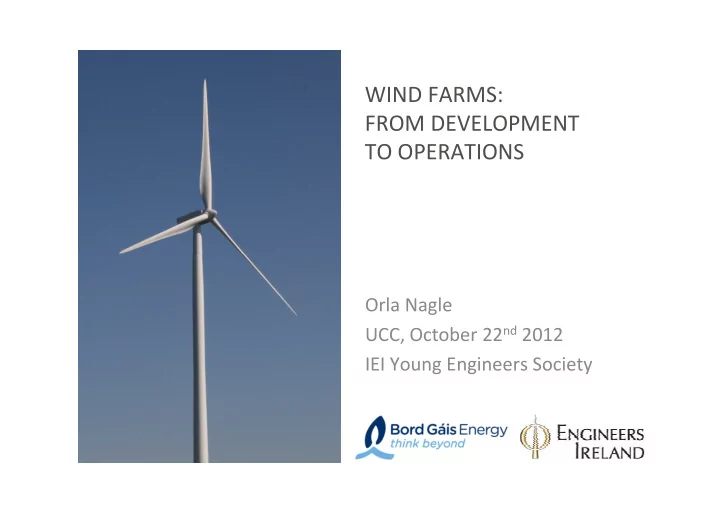

WIND FARMS: FROM DEVELOPMENT TO OPERATIONS Orla Nagle UCC, October 22 nd 2012 IEI Young Engineers Society
Wind Energy Development Stages Bord Gáís Energy 2
1. Feasibility Feasibility Assessment : • • Ground conditions, Land cover Ground conditions, Land cover • • Planning Policies – Site Zoning Planning Policies – Site Zoning • Proximity to neighbouring • Environmental Designation(s) development • Wind Resource • Archaeological • Site ownership • Prelim Grid Connection Assessment • Planning History - Site & Area • Access & Transportation • Prelim Landscape & Visual Assessment • Cumulative Impacts • Site Drainage & Hydrology • Assessment of Alternatives Bord Gáís Energy 3
1. Feasibility - cont’d • Preliminary turbine layout � Constraints identified � Viable development areas established � Site Capacity - no. of turbines • • A feasibility study can prove very effective in A feasibility study can prove very effective in identifying areas for further investigation and allows an early focus on relevant issues • Pre-planning discussions Feasibility Stage Consultation • Bord Gáís Energy 4
2. Assessment • Development Team • Environmental Assessment: � Environmental Impact Assessment (EIA) � Environmental Report • An EIA is a multi-disciplinary, iterative process • An EIA is a multi-disciplinary, iterative process designed to identify, characterise and quantify the likely effects of a proposed development on the environment • The approach to an EIA should be informed by: � Statutory requirements (EIA Directive and EIA Regs) � Consultation with statutory and non-statutory consultees � Current guidance and best practice Bord Gáís Energy 5
2. Environmental Assessment & Planning Application - cont’d Bord Gáís Energy 6
2. Assessment – cont’d • Typical Planning Process • Other possible consents & contracts: � CER - License to Construct, Authorisation to Generate � Felling License – Forestry Services � Grid Connection Agreement - Eirgrid � Land Lease Agreement Bord Gáís Energy 7
3. Construction Stage • Development & implementation of a Construction & Environmental Management Plan (CEMP), which defines � work practices � construction management procedures � � environmental responsibilities environmental responsibilities Ensuring environmental protection and planning compliance during development construction • Contractual requirement for Civil Contractor, Turbine Contractor, Electrical Contractor etc. Bord Gáís Energy 8
3. Construction Stage – cont’d • Surface Water Management Plan: � Site Hydrology � Drainage Infrastructure � Erosion & Sediment Control – buffer zones, silt traps, silt fencing etc. � � Watercourse Crossings – bridges, culverts Watercourse Crossings – bridges, culverts � Materials Storage – fuels, oils etc. � Consultation – IFI, OPW etc. Bord Gáís Energy 9
3. Construction Stage – cont’d Benefits of a CEMP & Good Environmental Practice on Site: Bord Gáís Energy 10
Questions?
Recommend
More recommend